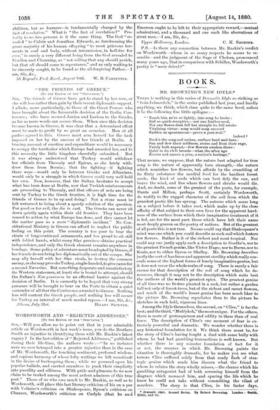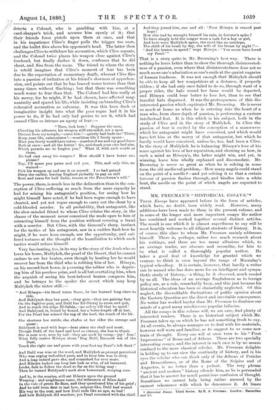BOOKS.
MR. BROWNING'S NEW IDYLS.* THERE is nothing in this series of Dramatic Idyls so striking as " Ivan Ivimovitch," in the series published last year, and hardly anything, we think, which rises quite to the same level, unless it be the following fine little epilogue :-
"' Touch him no'er so lightly, into song he broke :
Soil so quick-receptive,—not one feather-seed, Not one flower-dust fell but straight its fall awoke Vitalising virtue : song would song succeed
Sudden as spontaneous—prove a poet-soul !'
Indeed Rock's the song-soil rather, surface hard and bare : Sun and dew their mildness, storm and frost their rage, Vainly both expend,—few flowers awaken there : Quiet in its cleft broods—what the after age Knows and names a pine, a nation's heritage."
That means, we suppose, that the nature best adapted for true
song is the nature of apparently bare strength,—the nature which nourishes few flowers, but affords by the crumbling of its flinty substance the needful food for the hardiest forest seeds, the kind of seeds which can best defy the sun, and brave the wind, and live where flowers and shrubs would die.
And, no doubt, some of the greatest of the poets, for example, Dante and Milton, perhaps Scott, certainly Wordsworth, do testify to the rugged character of the soil from which the grandest poetic life has sprung. The natures which muse long on a subject before it takes root, which make up by the close affinity of that subject to their own lives for the apparent hard- ness of the surface from which their imaginative treatment of it is fed, are for the most part those which have left their name most deeply graven on the poetry of nations. But of the greatest of all poets this is not true. No one could say that Shakespeare's mind was one which you could describe as rock-soil which fosters few flowers. Rather is it of the richest and most tropical. Nor could any one justly apply such a description to Goethe's, nor to the greatest French genies, like Victor Hugo; nor to Burns, nor to Keats, nor to either Byron or Shelley. Mr. Browning describes justly the sort of hardness and apparent sterility which really con- ceals some of the highest forms of lonely imaginative genius, but it does not cover the whole realm of song. There is surely a fair excuse for that description of the soil of song which he de- nounces, though it may not be the description which suits best the authors of the world's greatest epics. The greatest genius of all time was no fir-tree planted in a rock, but rather a garden full not only of forest-trees, but of the richest and rarest flowers, and much of the world's lesser genius has been much liker to the picture Mr. Browning repudiates than to the picture he sketches in such bold, vigorous lines.
Among the Idyls themselves, the second, on "Clive," is far the best; and the third, " Multgykeh," the most unique. 'or the others, there is more of grotesqueness and oddity in them than of real force. The description of Clive's one moment of fear is ex- tremely powerful and dramatic. We wonder whether there is
any historical foundation for it. We think there must be, for the story of Clive's having fought a duel with some bully with whom he had had gambling transactions is well known. But whether there be any rninuter foundation of fact for it or not, the manner in which Mr. Browning paints the situation is thoroughly dramatic, for he makes you see what terrors Clive suffered solely from that ready flash of stra- tegic genius which made him discern what the friend to whom he relates the story wholly misses,—the chance which his gambling antagonist had of both screening himself from the disgrace which menaced him, and sparing the life which he knew he could not take without committing the vilest of murders. The story is that Clive, in his factor days,
Bi• Drama& 444 Second Series. By Robert Browsing. London : Smith, der, and Co.
detects a Colonel, who is gambling with him, at a card-sharper's trick, and accuses him openly of it ; that their friends force pistols upon them at once, and that in his impatience Clive's finger pulls the trigger too soon, and the bullet flies above his opponent's head. The latter then challenges Clive to withdraw his accusation, which Clive repeats, and the Colonel twice places his weapon close against Clive's forehead, but finally dashes it down, confesses that he did cheat, and flies from the room. The friend to whom the story is retold imagines that Clive's moment of fear has been due to the expectation of momentary death, whereat Clive flies into a passion of irritation at his friend's slowness of apprehen- sion, and points out that he has braved worse terrors than that many times without flinching ; but that there was something much worse to fear than that. The Colonel had him really at his mercy, for he might, if he had chosen, have affected mag- nanimity and spared his life, while insisting on branding Clive's reiterated accusation as calumny. It was this keen flash of imaginative insight into what the poor rogue had it in his power to do, if he had only had genius to see it, which had caused Clive so intense an agony of fear:-
" Then, look here ! Suppose the man, Checking his advance, his weapon still extended, not a span Distant from my temple,—curse him !—quietly had bade me There, Keep your life, calumniator !—worthless life I freely spare : Mine you freely would have taken—murdered me and my good fame Both at once—and all the better ! Go, and thank your own bad aim, Which permits me to forgive you!' What if, with such words as
these, He had cast away his weapon ? How should 1 have borne me, please ?
Nay, I'll spare you pains and tell you. This, and only this, re- mainod— Pick his weapon up and use it on myself. I so had gained Sleep the earlier, leaving England probably to pay on still
Rent and taxes for half India, tenant at the Frenchman's will."
The power, there, is much less in the delineation than in the con- ception of Clive suffering so much from the mere capacity he had for seizing his antagonist's position, for seeing how he might himself have acted, if he had been rogue enough to have cheated, and yet not rogue enough to carry out the cheat by a cold-blooded murder. In all probability, that antagonist, like the slow-minded friend to whom Clive relates the story, in the shame of the moment never conceived the mode open to him of extracting himself from the position without covering a fraud with a murder. But Clive, with the General's sharp instinct for the tactics of his antagonist, saw in a sudden flash how he might, if he were keen enough, use the opportunity, and suf- fered tortures at the thought of the humiliation to which such tactics would reduce himself.
Very fascinating, too, in its way is the story of the Arab who so loves his horse, Mul6ykeh, the pearl of the Desert, that he cannot endure to see her beaten, even though by beating her he would recover her from the thief who is robbing him of her. H6seyn, on his second-best horse, is pursuing the robber who is depriv- ing him of his peerless prize, and is all but overtaking him, when the anguish of seeing his best-beloved beaten conquers him, and he betrays to the spoiler the secret which may keep Mul6ykeh the victor still :—
" And H6seyn—his blood turns flame, ho has learned long since to ride,
And Buheyseh does her part,—they gain—they are gaining fast On the fugitive pair, and Dahl has Ed-Dirraj to cross and quit, And to reach the ridge El-Sabin,—no safety till that be spied ! And 13nh6yseh is, bound by bound, but a horse-length off at last, For the Pearl has missed the tap of the heel, the touch of the bit.
She shortens her stride, she chafes at her rider the strange and queer : Baheyseh is mad with hope—beat sister she shall and must, Though Dahl, of the hand and heel so clumsy, she has to thank. She is near now, nose by tail—they are neck by croup—joy ! fear ! What folly makes H6seyn shout ' Dog Dahl, Damned son of the Dust, Touch the right ear and press with your foot my Pearl's left flank !'
And Dahl was wise at the word, and Muleykeh as prompt perceived Who was urging redoubled pace, and to hear him was to obey, And a leap indeed gave she, and evanished for ever more. And H6seyn looked one long last look as who, of all bereaved, Looks, fain to follow the (lead so far as the living may : Then he turned Buh6yeeh's neck slow homeward, weeping sore.
And lo, in the sunrise, still sat H6seyn upon the ground Weeping : and neighbours came, the tribesmen of Henn-Amid In the vale of green Er-Hass, and they questioned him of his grief ; And he told from first to last how, serpent-like, Dahl had wound His way to the neat, and how Duhl rode like an ape, so bad ! And how Buheyseh did wonders, yet Pearl remained with the thief.
And they jeered him, one and all : ' Poor 116soyn is crazed past hope !
How else had ho wrought himself his ruin, in fortune's spite ? To have simply held the tongue were a task for a boy or girl, And here were Muleykoh again, the eyed like an antelope, The child of his heart by day, the wife of his breast by night r—
And the beaten in speed !' wept H6seyn : ' You never have loved my Pearl.'"
That is a story quite in Mr. Browning's best way. There is nothing ho loves better than to show the thorough disinterested- ness of a passion, even where that disinterestedness does not so
much move one's admiration as one's smile at the quaint vagaries of human fondness. It was not enough that Mul6ykeh should be able to keep all her competitors at a distance, if properly
ridden ; if she had only once failed to do so, through want of a proper rider, the halo round her fame would be departed, and H6seyn could bear better to lose her, than to see that fanciful halo dispersed. It was the grotesqueness of this dis- interested passion which captivated Mr. Browning. He is never
so much at home as when he is entering into the heart of a man who, from sheer depth of passion, is performing a curious
intellectual feat. It is this which is his subject, both in the study of Clive and in the story of Mul6ykeh. In Clive the passion of fear is excited by the conception of a mananivre which his antagonist might have conceived, and which would
have left him at the mercy of that antagonist, but which he hardly would have conceived, unless he, too, had been a Clive.
In the story of Mul6ykeh he is balancing 116soyn's love of his mare against his love of her reputation, and showing us how, in such a mind as H6seyn's, the latter might win, and yet, in winning, leave him wholly orphaned and disconsolate. Mr. Browning is never so great as when he is solving in some form the old mediaeval problem,—How many angels could stand on the point of a needle P—and yet solving it so that a certain fervour of passion flashes through, and kindles into a white
heat, the needle on the point of which angels are expected to stand.































 Previous page
Previous page